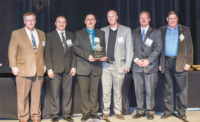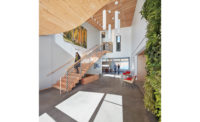More than five hundred construction and design leaders gathered in Denver in early April for the 2015 Rocky Mountain Green Conference to discuss the state of green building in Colorado and the issues affecting the city. The event was hosted the Colorado chapter of the U.S. Green Building Council, which said attendance was up by more than 50% over the previous year.

Don Saal, chair of the board of directors of USGBC Colorado, attributed the increased participation to expanded outreach in the commercial real estate and developer market and a highly educated Colorado building community. “The Rocky Mountain region is one of the most savvy development entities from the sustainability side,” he said. “They get it much more so than some of the other markets we compete with.”
“There is so much passion in our region’s green building community,” said Sharon Alton, executive director, USGBC Colorado. “If your mission is to transform an entire industry, you have to be passionate and bold.”
Lisa Stanley, vice president of product management at USGBC, said that Denver has become as a leader in sustainability. “This is one of the strongest cities we have in the United States. There’s real dedication to green building and a great community to support it.”
The opening session unveiled plans for Denver’s National Western Stock Show Complex, with a review of how the plan will harness public-private partnerships and reshape the Denver community. The soon-to-be-revamped area is one of the first experiences for many visitors to the Mile High City, and the new project will reflect the community’s message of opportunity and sustainability.
The National Western Center represents a visionary transformation of the National Western Complex and Denver Coliseum sites into a must-see destination and regional asset, enhancing current Denver landmarks through creative year-round activity. The master planning will bolster a variety of opportunities through the involvement of partners, including Colorado State University, the Denver Museum of Nature & Science, History Colorado and an advisory committee made up of residents, business owners and other stakeholders from the surrounding Globeville, Elyria and Swansea neighborhoods.
Multiple Education Tracks
Rocky Mountain Green featured four education tracks and more than 20 sessions reviewing best practices in the region. The developers of Lamar Station Crossing discussed their commitment to making the Lakewood community one of Colorado’s first LEED for Neighborhood Development (LEED ND). The development was the first major investment in the neighborhood in 40 years.
“We felt it was very important to make a strong statement for smart growth and sustainability here,” said Ryan McCaw, sustainability and grant programs manager at Metro West Housing Solutions.
Another session explored how Denver’s Aria Apartments encompasses the triple bottom line by providing an underserved population with highly sustainable homes at a price that residents and developers can afford. Chuck Perry, managing partner at Perry Rose; and Julie Edwards, director of sustainability at OZ Architecture; discussed social equity issues, methods of sustainability for low-income individuals, financing strategies and achieving LEED-Platinum status on affordable housing projects.
Perry said, “The issue we are really looking at is how the sustainable movement is trying to answer the question of resiliency.”
A highlight from the conference was the official launch of LightStanza, a daylighting software. Studies correlate full spectrum natural light with improved health, performance and satisfaction. Light Foundry LLC, the pioneering Boulder-based startup launched the public beta of LightStanza, an easy-to-use daylighting web application that helps users do extraordinary things with daylight. The launch comes after several months of private beta testing with national and international leaders in the green-building community.
Rocky Mountain Green 2015 also featured the first “Inspire Colorado: A Live Storytelling Contest.” Three Colorado organizations competed for a $2,500 prize donated by USGBC Colorado. Finalists WalkDenver, Boulder Food Rescue and Spring Back Colorado demonstrated their storytelling skills and inspired hundreds of attendees with their narratives.
Boulder Food Rescue won the competition after Michael Benko, volunteer coordinator, told a story about dumpster diving to illustrate the company’s goal of creating a more just and less wasteful food system. “It’s one of those things that permeates our society and really is everywhere, especially when you start looking for it,” said Benko. “That story illuminates it and hopefully got some people thinking about the food on their plates.”


